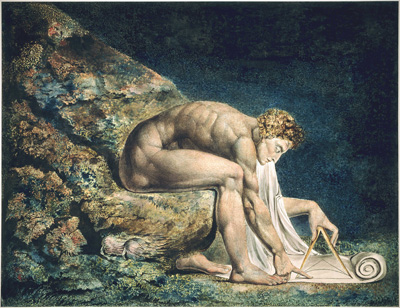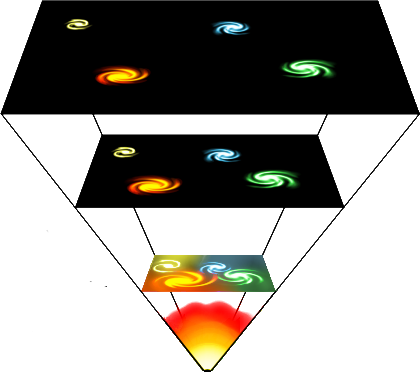
Who made the laws of nature?
I was a bad physics student at school. Not only did I have no physical intuition whatsoever, I also didn't believe most of it. How, I wondered, can we possibly claim that nature "obeys" the "laws" that we have written down in text books?
It turns out that in my ignorance I had something resembling a point. While physicists are busy coming up with equations that express the laws of nature, philosophers are thinking about what a law of nature actually is. And they don't all agree.
Divine law?
The very term the laws of nature expresses something that seems clearly true. As opposed to parking restrictions or drug legislation, those laws don't belong to us humans, they belong to nature. In fact, they are completely independent of us. Even if we weren't around, apples would still fall to the ground just as the law of gravitation predicts they should.

What makes an equation a law of nature?
Not only are the laws independent of us: they also appear to sit over and above all other objects to which they apply. "In some sense [the laws of nature] are not part of the Universe," says George Ellis, a mathematician and cosmologist at the University of Cape Town. "They underlie the Universe because they control how matter behaves, but they are not themselves made of matter. Laws of physics aren't made of lead or uranium or something." So it appears that the laws of nature exist in some abstract realm of their own. Through some mysterious mechanism we have access to this Platonic realm and can piece some of those laws together.
The words we have used so far — "control" and "should" — hint at something else too: the idea that the laws actually govern, or dictate, how nature should behave. "In this view the laws are active," explains Barry Loewer, a philosopher at Rutgers University in New Jersey. "They take the state of the Universe at a time and produce subsequent states."
This, in a nutshell, describes what Loewer calls the governing view of the laws of nature. The idea that those laws are fundamental elements of our reality, separate from all the material "stuff" out there, and that they dictate natural processes. This raises an immediate question. Where do those laws come from? Who made them? "When this notion of governing law was originally introduced in the 17th and 18th century, it went along with the idea that there are god's laws," says Loewer. "That god [made] the laws, and that the laws are god's way of making or controlling the motions of material bodies in the Universe. By conceiving of the Universe as governed by god's laws physicists could see themselves as involved in the task of discovering the laws that god chose."
Today the idea of god sits uncomfortably with many of us, which leaves the governing view of the laws with some explaining to do. "Once god drops out of the picture this does become very puzzling," says Loewer. "What does it really amount to, to talk about the laws governing the evolution of the state of the Universe? But that language is still part of physics. You can even find it in ordinary physics textbooks where physicists will talk of Schrödinger's equation 'governing the evolution of the wave function', for example."
In some sense the governing view of the laws of nature is a working assumption many physicists make while on the job. When you are working on a specific physics problem you behave as if the laws were governing things, because after all they govern your calculations. But there is another possibility which, philosophically speaking, makes a big difference. Perhaps the laws don't actively govern natural processes, but merely describe them. It's a tough one to figure out. "We don't know whether the laws are descriptive or prescriptive and that's one of the big difficulties," says Ellis. "We can't tell."
Or pattern spotting?
Things change, however, if you take more of a bare bones approach to reality. Perhaps reality is simply a distribution of "stuff", endowed with certain properties, through time and through space. What we call the laws of nature are then just patterns within this Humean mosaic (named after the philosopher David Hume). This is the idea behind best systems analysis, an approach developed largely by the American philosopher David Lewis in the second half of the twentieth century. Loewer likes this idea. And he thinks it may be attractive to physicists troubled by the question of how something abstract and outside of the Universe can govern the motions of bodies inside it.

Isaac Newton depicted by William Blake as a "divine geometer".
Best systems analysis feels like quite a practical approach to the laws of nature. Scientists look at all the information they have about the Universe (or some aspect of it) and try to come up with a system, a theory, to describe that information. As they do this they usually find that making certain fundamental assumptions allows them to derive a lot of information about the facts they observe. For example, if you have been experimenting with dropping objects, you will have noticed that they always seem to fall to the ground. So a good fundamental assumption to base your theory on may be something like "the ground attracts things". If you assume this as a basic fact, then many phenomena you observe suddenly make sense. Such a fundamental assumption is a candidate for what we might call a law.
The trouble is, of course, that there may be many different theories describing the same thing. Newton's theory of gravitation isn't based on the idea that "the ground attracts things", but on the inverse square law of universal gravitation, which describes the gravitational force between any two bodies. The point is that Newton's theory is better because it is more general. What we decree to be laws are the fundamental truths of the best systemisation of our observations.
The idea immediately raises the question of what counts as "best". "I think of this as an ideal, not that anybody knows what the best systemisation is," says Loewer. "But the idea is that there is a systemisation that best combines the virtues that physicists want the theory to have. These include things like informativeness, applicability, simplicity, exhibiting symmetries, having conservation principles and so on. Not every truth will be contained within, or implied by, the 'best system' because implying more may mean making the theory more complicated, over-complicating it, or giving up on symmetry principles, and so on. The theory, though, tries to optimise these various different constraints: being informative, being simple, etc."
The optimisation gives the laws of nature a distinctly human flavour. It's physicists who decide what's best and they may not agree with each other. But as Loewer points out, the meat of the theory is objective, because it has to accurately describe what nature does. Any theory that doesn't tell you to run when you see a piano hurtling towards you from the tenth floor will immediately be discarded.
Do we care?
Does any of this really matter? Why should we care whether laws of nature are prescriptions, descriptions, or patterns? The important thing is that the equations we come up with (usually those laws are phrased mathematically) give reliable predictions so we can build cars and cure diseases.

According to current theories the Universe expanded from the Big Bang 13.8 million years ago.
But Loewer believes that the way we think about the laws can influence the questions we ask about the world. Physicists believe that the Universe started with the Big Bang 13.8 billion years ago. In trying to explain some of the features we see in our Universe, for example that heat flows from hot bodies to cold ones and that time has a direction, they came to the conclusion that it must have started out in a very particular state. It must have had a very low entropy, which loosely speaking means that it was very highly ordered (see here to find out more).
This seems to call for explanation. Why did the Universe start out in such a highly ordered state, rather than a more jumbled up one, which seems more likely? The laws of physics we know of can't explain this, so they must be incomplete. The question has been raised as one of the biggest mysteries of cosmology. Entire cosmological theories have been developed to explain it.
Loewer argues that the best systems approach sheds light on this problem because it's a lot more permissive about what we term the laws of nature. The governing view of the laws requires them to be dynamical: they govern how the Universe evolves from one point in time to another. The initial state of the Universe doesn't have that dynamical flavour. It's just a fact and therefore requires explanation in terms of the laws.
The best systems approach, however, allows all sorts of assumptions to count as laws, as long as they make a theory "better" in the sense we saw above. The assumption that the Universe started with a very low entropy does make our theory of the Universe better: we can derive features from the world from it that otherwise can't be derived, such as the flow of heat or the flow of time. Therefore, so Loewer argues, let's reject the idea that a theory that can't explain the low entropy start of the Universe is defective. And let's accept the low entropy start as a law of nature. There's no need to explain it, then, and one of physics' biggest mystery vanishes in a puff of smoke.
This may feel like a cop-out, but Loewer points out that we don't subject the dynamical laws of nature to the same scrutiny as assumptions like the low entropy start of the Universe. Nobody asks why the inverse square law of gravitation isn't an inverse cube law, or an inverse to-the-power-of-four law. We just accept it. "The idea that somehow a system is defective if it doesn't include an explanation of the boundary conditions is no more convincing to me than the complaint that the system isn't complete until we have explanations of the dynamical laws," he says. "As Ludwig Wittgenstein once said, 'Explanations come to an end somewhere.'"
Does it explain anything?
Personally I feel quite comfortable with the best systems approach to the laws of nature. It doesn't seem to involve "spooky metaphysics", as Loewer calls it. But it also makes me a little sad. It seems to suggest that we can only ever describe the world, by spotting the patterns within it, but never really understand it. Loewer points out, however, that some understanding resides in the unification of laws. Newton's great insight was that the same set of equations describes the behaviour of all objects, be they pendulums or footballs here on Earth, or planets and comets up in space. Having such a unifying description does feel like we have understood something significant about how the world works.
But it's a subtle business. If we really want to explain the phenomena we see around us, we need to spot chains of cause and effect and that's a famously tricky problem. We suspect that one thing causes another when both things tend to appear together. But correlation isn't causation: it may be purely coincidental, or down to hidden factors we haven't yet spotted. Just how one can discern whether a correlation is a causation, if there even is such a thing as causation in the vast Humean mosaic, is another question philosophers vigorously debate. We'll leave that for another time.
About this article
Marianne Freiberger is Editor of Plus. She interviewed George Ellis and Barry Loewer at the International Philosophy of Cosmology in September 2014.
Comments
Anonymous
I am not sure how one can say for certain that "The laws of physics we know of can't explain this" ("this" being the apparently required low entropy of the big bang). In fact there is not yet any theory combining the "laws" of the standard model of elementary particle physics with those of quantum gravity, so we don't yet know whether or not such a combined theory will "explain" the condition of low initial entropy. If that low entropy condition really is necessary in order to explain the observed phenomena, then the real question will be whether or not it can be seen to follow logically from other assumed features of the theory (if and when such a theory is ever proposed and shown to be mathematically sound). If it does not, then noone will call putting it in a "deficiency" of the theory, but if it does then adding it as an extra assumption would be a deficiency of economy - and no amount of philosophizing can alter the fact that to determine which case applies will be an interesting mathematical question. Two issues that may be worth considering are whether the conditions for the combined theory (if and when one is eventually discovered) might require specially high symmetry (and so low entropy) at a point singularity, and whether any singularity that is not of low entropy could be associated with a direction of "time" with respect to which it qualifies as "initial".
Anonymous
Why do we have to consider laws of nature as something sitting outside the Universe? Just because they govern everything in the Universe, namely everything sits on top of these laws, doesn't mean they are not part of the Universe, nor does it mean they existed before the Universe was created.
Referring to this sentence, " ... they also appear to sit over and above all other objects to which they apply", it seems to me more of a language context than it explains something about the laws of nature.
Wouldn't it be more conceivable to say that laws of nature are properties of the matter/energy, are part of the matter/energy?
Anyway, this is my opinion, I would highly appreciate any comments/answers. As you can see I'm not giving answers, I'm just asking for them.
Thanks!
Anonymous
That is the question that provides the answer to correct assumptions that the "laws" are not "necessary" to come "before" the universe. People jump into assumptions and beliefs, without imagining other possibilities. Often, they do so, because they are judging new things from their preconditioned and prejudicial beliefs, such as "God". So all roads then lead to the convenient answer-all belief of "God".
Anonymous
I'm not so sure that the law of nature concept emerged exactly as Loewe proposed, something controlling or governing the world, but perhaps for a short while to mean the very opposite. Taking the word "nature" to mean inborn character, then an object obeying the laws or dictates of its own nature, such a gas expanding to fill the space available to it, is in effect obeying no law at all or anything imposed externally. The phrase "obeying a law of nature" has the logic and semantics of "being your own boss" - so you actually have no boss, or "enjoying your own company", so you're happy alone without company. All these expressions are vivid because they are self contradictory, they are jocular oxymorons rather like "birthday suit", "Shank's pony", coined in an age which delighted in verbal pranks.
We can easily see this in grade school laws like the expansion of a gas, water seeks its own level, unsupported bodies fall to the ground, none of which are formulated as equations, but what about laws of motion such as Kepler's and Newton's, most of which are? I think these are interesting transitional stages. Newton's first law of motion, though not to my knowledge accompanied by an equation, is also often designated "The law of inertia" as if we're deciding to abandon the somewhat animistic idea of a body having an active nature at all. Now we're ready to use equations such as f = ma, and its nature has disappeared altogether. Now nature, like gravity (originally 'heaviness'), has ceased to be the property of an individual entity. Where next?
Anonymous
The behavior of matter and energy could be thought of as being the inevitable outcome of random quantum events. We know that tiny particles have a statistical "fuzziness" about them, as seen in the double slit experiment. The larger objects get the less fuzzy they are. The larger the number of quantum events, the more predicable the outcome. When behavior is completely predictable we call it a law.
Anonymous
"To see what is front of one's nose needs a constant struggle." ~ George Orwell.
If there is organization to the universe, there must be an organizing intelligence. If time and space are part of our universe, something must exist outside space and time.
Solaris89
There is no need of an organizing intelligence nor for anything to exist outside spacetime. That is only what one believes when they have been brainwashed since childhood to think there is a god. It is time to leave the ancient mindset behind...
RickM
The struggle is real. Let's face it, with all of our collective scientific and technological achievements in history our biggest questions remain unanswered (who are we?, why are we? where did the "laws"of nature originate?, is God real? etc.) Curiosity it seems is the most important, inseparable part of human nature as it has allowed us to advance our understanding of our universe immensely. But please, let's not pretend that any of us really know the answer to "what were all experiencing" just yet.
Marty chilcutt
God is not.! Maybe it’s just not a very good idea after all.
Martin Mayberry
People do their best to skirt the fact that logic has left the building if you leave God out. if anything thing exist at all, the best possible answer that is that a creator exist. If you are talking about the laws of the universe or the INFORMATION in the DNA of the cell. Ignore it if you wish but to ignore God and his existence makes science 100% gobbaldy gook.
Justin ORosz
So you want people to commit the argument from ignorance? Wow, so you are fundamentally illogical.
Rez
The counter argument to the “argument from ignorance” is given enough time for observation and better scientific tools, everything can be “knowable”. I don’t think we can ever arrive there. Once we figure out the origins of the Big Bang do you think the questions will stop? At the end I think it becomes an existential question: is everything an accident or is there purpose/meaning inherent in the universe? For purely practical reasons I am finding that building on purpose rather than accident or “we don’t know yet” or “it’s just the way it is” leads to a more fulfilling experience of life. Is this a sort of psychological sedative? Perhaps, but again, from a practical sense, it has improved all areas of my life without a noticeable side effect.
Mushtaq
I think laws of nature
are not outside the universe. These laws are caused by the material of the universe. But there must be something before the material. Suppose there was God but what was before that God ? We human minds can never understand it.